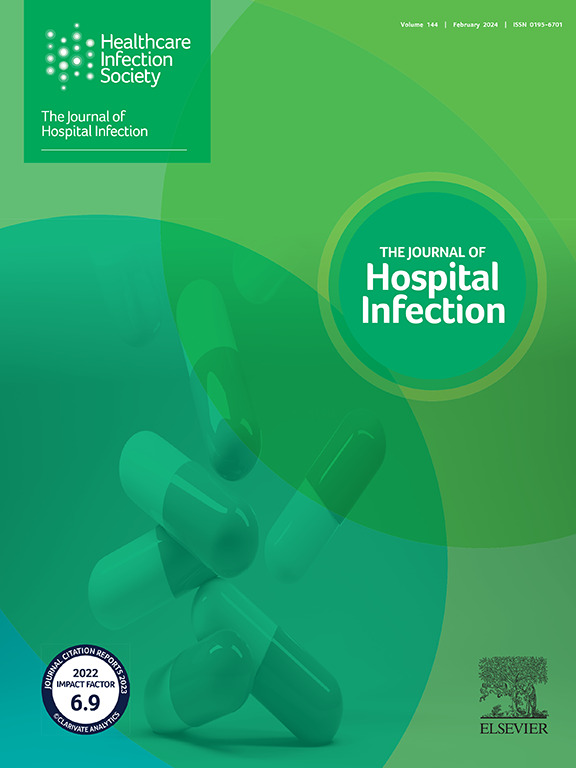State of infection prevention knowledge among healthcare professionals in Japan: a questionnaire survey analysis using text mining
IF 3.1
3区 医学
Q1 INFECTIOUS DISEASES
引用次数: 0
Abstract
Background
Healthcare-associated infections (HAIs) are an important issue that needs to be addressed continuously in healthcare institutions Healthcare professionals (HCPs) are expected to strengthen educational programmes on infection prevention. Although the incidence of HAIs in Japan has been decreasing, the actual state of knowledge on infection prevention among HCPs remains unclear.
Aim
To clarify the actual infection prevention knowledge of HCPs in Japan.
Methods
The study participants were 1158 HCPs working in healthcare institutions with frequent contact with patients (283 doctors, 591 nurses, 115 physical therapists, 97 radiologists and 72 medical technologists). HCPs described the infection prevention behaviours they adhered to consciously via an online self-administered questionnaire. Data were analysed by text mining. Categories were extracted from the responses to reveal HCPs' infection prevention knowledge.
Findings
More than half of the participants (64.9%) were aged >40 years, and 48.1% had >20 years of clinical experience. The majority of the participants were nurses (51.0%), 43.9% had a bachelor's degree, and 56.6% were female. Seven categories regarding infection prevention knowledge were extracted: ‘performing hand hygiene and gargling’, ‘wearing personal protective equipment’, ‘strengthening one's immunity’, ‘protecting oneself and patients from infection’, ‘distinguishing clean and unclean zones’, ‘actions to prevent transmission to others in daily life activities’ and ‘maintaining distance from others’.
Conclusion
These results suggest that most HCPs working in healthcare settings in Japan prioritize and adhere to standard precautionary measures, and the low incidence of HAIs may be influenced by perceptions of the knowledge of ‘handwashing and gargling’ among HCPs.
日本医护人员的感染预防知识状况:利用文本挖掘进行的问卷调查分析。
背景:医疗保健相关感染(HAIs)是医疗保健机构需要持续解决的一个重要问题,医疗保健专业人员(HCPs)应加强感染预防教育计划。虽然日本的 HAI 发生率一直在下降,但医护人员对感染预防知识的实际掌握情况仍不清楚:研究对象是在医疗机构工作、经常接触患者的 1158 名 HCP(283 名医生、591 名护士、115 名理疗师、97 名放射科医生和 72 名医疗技术人员)。医护人员通过在线自填问卷的方式描述了他们自觉遵守的感染预防行为。数据通过文本挖掘进行分析。从回答中提取分类,以揭示高级保健人员的感染预防知识:超过半数的参与者(64.9%)年龄大于 40 岁,48.1% 的参与者拥有 20 年以上的临床经验。大多数参与者为护士(51.0%),43.9%拥有学士学位,56.6%为女性。我们提取了七个有关感染预防知识的类别:"进行手部卫生和漱口"、"穿戴个人防护用品"、"增强自身免疫力"、"保护自己和病人免受感染"、"区分清洁区和不洁区"、"在日常生活活动中防止传染给他人的行动 "和 "与他人保持距离":这些结果表明,在日本医疗机构工作的大多数卫生保健人员都会优先考虑并遵守标准的预防措施,而 HAI 的低发生率可能受到卫生保健人员对 "洗手和漱口 "知识认知的影响。
本文章由计算机程序翻译,如有差异,请以英文原文为准。
求助全文
约1分钟内获得全文
求助全文
来源期刊

Journal of Hospital Infection
医学-传染病学
CiteScore
12.70
自引率
5.80%
发文量
271
审稿时长
19 days
期刊介绍:
The Journal of Hospital Infection is the editorially independent scientific publication of the Healthcare Infection Society. The aim of the Journal is to publish high quality research and information relating to infection prevention and control that is relevant to an international audience.
The Journal welcomes submissions that relate to all aspects of infection prevention and control in healthcare settings. This includes submissions that:
provide new insight into the epidemiology, surveillance, or prevention and control of healthcare-associated infections and antimicrobial resistance in healthcare settings;
provide new insight into cleaning, disinfection and decontamination;
provide new insight into the design of healthcare premises;
describe novel aspects of outbreaks of infection;
throw light on techniques for effective antimicrobial stewardship;
describe novel techniques (laboratory-based or point of care) for the detection of infection or antimicrobial resistance in the healthcare setting, particularly if these can be used to facilitate infection prevention and control;
improve understanding of the motivations of safe healthcare behaviour, or describe techniques for achieving behavioural and cultural change;
improve understanding of the use of IT systems in infection surveillance and prevention and control.
 求助内容:
求助内容: 应助结果提醒方式:
应助结果提醒方式:


